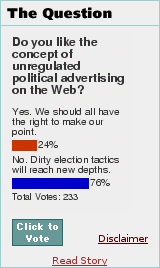Wikileaks, currently vapor, may be a joke. If Wikileaks is not a joke and if it successfully exposes a large number of secrets, I’d find it hilarious to see this happening on a public website and without financial incentives. P2P, digital cash, information markets, and crypto anarchy? Nope, just a wiki and a communinty.
Wikileaks FAQ:
WikiLeaks will be the outlet for every government official, every bureaucrat, every corporate worker, who becomes privy to embarrassing information which the institution wants to hide but the public needs to know. What conscience cannot contain, and institutional secrecy unjustly conceals, WikiLeaks can broadcast to the world.
Untraceable Digital Cash, Information Markets, and BlackNet (1997, but these ideas spread widely in the early 1990s):
One of the most interesting applications is that of “information markets,” where information of various kinds is bought and sold. Anonymity offers major protections for both buyers and sellers, in terms of sales which may be illegal or regulated. Some examples: corporate secrets, military secrets, credit data, medical data, banned religious or other material, pornography, etc.
Why is more information not leaked on the net already? The technology exists to do so anonymously and has for a long time. Why is there not (or to what extent is there) a market for secrets? Again, the technology exists.
Perhaps lack of the relevant institutions in each case. One could email secrets or post to a blog anonymously, but what then? Will anyone notice? One could want to sell secrets, but how to find a buyer?
If Wikileaks succeeds it will be because it will provide, or rather its community will be, the relevant institution. Again from the Wikileaks FAQ:
WikiLeaks opens leaked documents up to a much more exacting scrutiny than any media organization or intelligence agency could provide: the scrutiny of a worldwide community of informed wiki editors.
Instead of a couple of academic specialists, WikiLeaks will provide a forum for the entire global community to examine any document relentlessly for credibility, plausibility, veracity and falsifiability. They will be able to interpret documents and explain their relevance to the public. If a document is leaked from the Chinese government, the entire Chinese dissident community can freely scrutinize and discuss it; if a document is leaked from Somalia, the entire Somali refugee community can analyze it and put it in context.
I have not read the Wikileaks email archived at cryptome.
 76% say “No. Dirty election tactics will reach new depths.” in a San Francisco Chronicle online poll (no permalink, see image at right).
76% say “No. Dirty election tactics will reach new depths.” in a San Francisco Chronicle online poll (no permalink, see image at right).